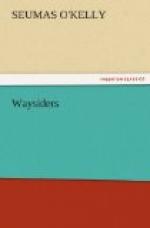The Herd groped through the darkness for his house like a half-blind man, his arms out before him, and a sudden gust of wind that swept the hillside shrieked about the blood of the white goat that was still wet upon his hands.
THE SICK CALL
A man wearing the grey frieze coat and the soft black hat of the peasantry rode up to the Monastery gate on a wiry, long-tailed nag. When he rang the bell at the hall-door there was a clatter of sandals on a flagged hall inside.
The door was opened by a lay Brother in a brown habit, a girdle about the waist from which a great Rosary beads was suspended. The peasant turned a soft black hat nervously in his hands as he delivered his message. The Friar who visited ailing people was, he said, wanted. A young man was lying very ill away up on the hills. Nothing that had been done for him was of any account. He was now very low, and his people were troubled. Maybe the Friar would come and raise his holy hands over Kevin Hooban?
The peasant gave some account of how the place might be reached. Half an hour later the Spanish Friar was on a side-car on his way to the mountain. I was on the other side of the car. The Spanish Friar spoke English badly. The peasantry—most of whom had what they called Bearla briste (broken English)—could understand only an occasional word of what he said. At moments of complete deadlock I, a Mass server, acted as a sort of interpreter. For this, and for whatever poor companionship I afforded, I found myself on the sick call.
The road brought us by a lake which gave a chilly air to the landscape in the winter day, then past a strip of country meagrely wooded. We turned into a narrow road that struck the hills at once, skirting a sloping place covered with scrub and quite dark, like a black patch on the landscape. After that it was a barren pasture, prolific only in bleached boulders of rocks, of bracken that lay wasted, of broom that was sere. It was a very still afternoon, not a breath of wind stirring. Sheep looking bulky in their heavy fleeces lay about in the grass, so motionless that they might be the work of a vigorous sculptor. The branches of the trees were so still, so delicate in their outlines against the pale sky, that they made one uneasy; they seemed to have lost the art of waving, as if leaves should never again flutter upon them. A net-work of low stone walls put loosely together, marking off the absurdly small




